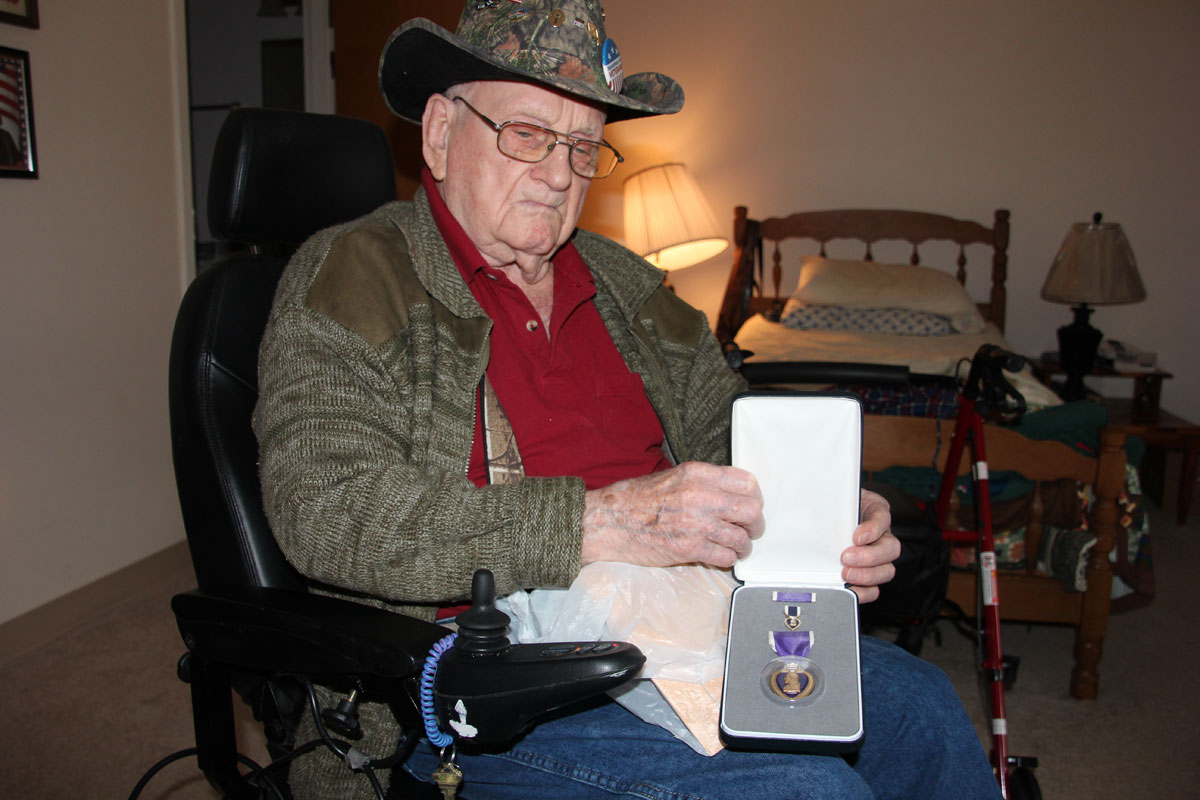Everett Gasper’s story is a hard one to write. He is a decorated World War II veteran, proud of his service, yet troubled by sacrifice. It is difficult to put into words all that this humble hero has seen and done in the adventure of his life.
Everett joined the Army on November 22, 1941. He was born and raised in Jasper County, Indiana, and was working as a car mechanic before enlisting.
Basic training was in Texas, then Gasper’s company was moved to a camp on the East Coast. In the later years of the war, they traveled to San Francisco by train, and From there, they were sent to Australia, by boat, where most of their equipment was lost in storms that ravaged the Pacific Ocean.
Gasper remembers out-maneuvering the Japanese ships with their own. His ship was meant for Tasmania, but because of Japanese torpedoes they had to go around the bottom of Australia and up the other side.
They landed at an Australian port, where conditions were not great. They were given corn beef sandwiches that were “green as grass” and the soldiers that ate them anyway got sick. Mosquito netting was a necessity to keep out monstrous mosquitos.
“We went from island to island,” said Gasper. “We worked our way up North, to Port Moresby. It was a proud moment to be there. That is where the Japanese were. We ran them over the mountain.”
Gasper learned how to dig his own foxhole and how to wade across rivers, with his ammo held high above his head. He and the men constantly had to sneak through the woods, since the Japanese soldiers would climb coconut trees and wait for American soldiers to walk in range of their high-powered rifles, he explained.
“There was a tall grass field we had to crawl through one night,” he said. “The next morning, the Japs set fire to it. Jap planes flew overhead, to shoot at us, but P38s ran them off.”
When they had finally taken the island, the army played a movie on a huge screen to celebrate their victory, yet that only drew out more Japanese troops.
That night was scary, and dangerous, but that night, Gasper earned his Purple Heart. While fighting, an exploded bomb left shrapnel in his leg and he had to be sent back to the continental U.S. for treatment. Yet, as soon as he was healed, he returned to the rest of his company, who were still fighting in Australia.
 The shrapnel-induced hospital visit just added to the list of why his army friends teased Gasper for being “accident prone.” In 1942 he had a kidney removed. He contracted Yellow Fever that same year and when Gasper finally left the military, three and a half years after joining, it was because of another injury in the field.
The shrapnel-induced hospital visit just added to the list of why his army friends teased Gasper for being “accident prone.” In 1942 he had a kidney removed. He contracted Yellow Fever that same year and when Gasper finally left the military, three and a half years after joining, it was because of another injury in the field.
He started as a rifleman and left as Private, First Class.
After the military, Gasper worked a couple different jobs in his community. He drove a cab in Gary, Indiana, and fought fires as a volunteer for Lake Station Fire Department 133.
He settled down in Lake Station with his wife, Barbara and working on cars became a pastime he shared with his five sons.
“We liked to work on cars. We fixed them up,” he said. “I’d help my boys with cars and they would help me. There were good times, and there were hard times. Just like with all families.”
Now he lives at Miller’s Merry Manor in Portage, Indiana.
“I never dreamed that I would know someone in this war,” says Kim Walters, the Community Relations Director at Miller’s. “Everett is 97-years-old and he was 22-years-old when he joined the army in 1941. Personally, I am honored to know Everett, he has such a kind and caring spirit, and a joy to have here at Miller’s Senior Living.”
Since relocating to the living center, Gasper has made sure to keep his memories close.
The medals he received are safely kept in their original boxes. They include the Purple Heart, an Asiatic-Pacific Theatre Ribbon, two Bronze Battle Stars, an American Defense Ribbon, and a Good Conduct ribbon.
His favorite hat is decorated with pins that represent the military. Honoring the medals and hat is his personal way of stressing the importance of remembering Veterans.
“I wasn’t a prisoner of war, but I wear the pin,” he said. “To support them.”
